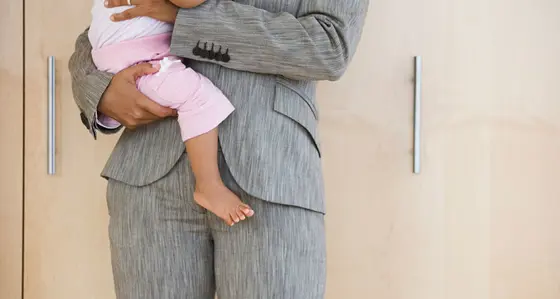
Be a codebreaker
5 min read 16 February 2025
I was born in Durban to parents of Indian heritage – they grew up under Apartheid, experiencing the racial divides in South Africa much more than I did. My parents were economic migrants to the UK. My Dad is a primary school Head Teacher and my Mum is an English Teacher at a secondary school. We moved to London with my two older brothers when I was five. Moving here was an opportunity for my parents to give us a better education and more opportunities within a safer, tolerant society. Growing up, we spent most summer holidays back home in South Africa, staying with my grandparents and enjoying quality time playing on the beach or indulging in Durban’s delicious culinary scene.
Early adjustments
The first few years here were quite challenging. My parents didn’t have much help and you become acutely aware that it’s going to be a tougher life with smaller homes, colder weather and for the most part, your immediate family to rely upon. But then you adjust, you make friends and realise it’s better. Now I love London. I love the fact that it’s a multicultural society. I have friends from all over the world and that’s awesome. It’s taught me so much about different cultures, different religions, different experiences.
Friendship but not as I know it
The first time I noticed that not everyone was exposed to the same melting pot experience, was at university, where I read economics. My friend (who was also from London) and I were sharing a flat with another student from a smaller, less diverse English town who told us, ‘You are my first Asian friends’. We weren’t offended, it wasn’t racist, we found it funny. We had both grown up in London; we didn’t have black friends, or Asian friends or Arab friends, we just had friends. But I suppose it was the first time I understood unconscious bias.
Cultural alienation
I became aware of the idea of rewriting ‘the code’ at my first graduate job. I found it quite difficult at first. It’s a upper-class organisation, steeped in British tradition with much of the leadership from similar backgrounds with similar hobbies that were not relatable to a young man like myself from London! It can be quite alienating but I was comforted by finding my ‘tribe’ – similar graduates and young professionals who had similar interests to me and were experiencing the same thing.
In general, I have always been conscious of being a minority or the only person of colour within a meeting room. Often this is even more difficult for female colleagues, as it is even more rare to meet a senior woman of colour. Throughout my early career – within both the social and work environment – I found myself adjusting to the code rather than being my authentic self. Whereas, when I joined Baringa in 2021, I immediately felt comfortable, in a truly inclusive environment, where people are genuinely curious and happy to celebrate their culture, upbringing and individual experiences.
Everyone has their own code
We are making huge strides towards being more diverse but there are aspects of the code that will take longer to rewrite. I have female colleagues who worry about having children and how that might hold them back. Then there are colleagues of faith who worry that there is a glass ceiling because people get to a certain level then move on. What I have found is that everyone is adapting somehow but the code is not as obvious as culture, religion or race. I constantly code-switch between three or four different things, from how I present at work, to how I speak around my parents, to how I would be in South Africa or around my London friends. For me, that is what rewriting the code is. It’s having different ways of adapting to different situations and accepting that it can take a while to feel comfortable in your own skin and to show your authentic self. It has taken time for me to see that this is a strength – adaptability while being true to yourself is a skill, a form of survival and should be championed.
Bring everyone in
According to a recent Thomson Reuters report, diversity in the boardroom is slowly rising; almost all FTSE 100 companies now have at least one board member from an ethnic diversity background. However, there is still work to be done to keep increasing those statistics and to maintain people of all races, faiths and genders at management level. For example, of the FTSE 100 companies surveyed, 35 are yet to reach the target of a minimum of 40% female representation on their boards by 2025. I think it’s important for Baringa to be an organisation that doesn’t just hire the same personality type but looks at more individual backgrounds and stories – which will continue to keep us an authentic, inclusive organisation. We need to take those diverse perspectives and voices to clients – whether that’s female, ethnic, religious, sexually diverse. It is more productive and leads to better outcomes for our clients.
There’s power in diversity
Progress is not always as simple as something like 50% equality of gender at leadership level – that’s great, of course, but it’s about having advocates: men who will speak up for women, Partners who will speak up for racial diversity and equality. I feel strongly that everyone feeling comfortable in their own skin comes from leadership. Those who have managed to succeed should be the role models, making themselves known, being on the end of a phone for someone to talk to. I also want to see the dichotomy of different cultures, faiths and backgrounds embraced so that they can be weaved into our stories at Baringa, rather than making us feel like outsiders. I grew up in two completely different worlds. I learnt to adapt naturally rather than by choice. Not everyone is so lucky.
Be true to yourself
I like to think that now after five or six years of work I’ve become more conscious of helping others and trying to be a friendly person they can speak to. If I met younger me, fresh from university, I would say bring your authentic self and your story to work. You don’t need to fit the mould. It’s easier, less of a burden and less exhausting than pretending to be someone you’re not. You learn that through experience and trying different things, you don’t have to do everything quietly in the background. Be who you are outside work as much as possible inside work, don’t feel it’s you that always has to change to the situation.
More from this series

Supporting different versions of our authentic selves
Parris Lougheed, Executive Assistant, describes her journey as a Black woman discovering the code and finding support throughout Baringa. She believes that rewriting the code must be authentic and allow us to bring our everchanging true selves to work. Parris recently became a parent, and this means discovering a new code, and a new version of her working self.
Read more
Dancing with the code
Sam Bennett, Knowledge Management Advisor, shares exactly what it means to recognise and work within the code. After suffering from imposter syndrome before even starting at Baringa, Sam describes how they were able to become more them at work, how Baringa supported them, and how change now needs to come from the wider industry.
Read more
Wonder Woman doesn’t exist…
Olena Isaieva is happy to admit she is no Wonder Woman. It’s not possible to do everything by yourself, and you shouldn’t try. Our Director in Commodities and Energy Trading in Switzerland credits a strong support system with the success and fulfilment she enjoys, both in her personal life and career. Read on to find out how she is using her own experiences as a woman in male-dominated environments, to support and encourage others at Baringa.
Read more
Freeing the chameleon
From the covert world of law enforcement and intelligence to time in consulting firms big and small, James Hampshire has done his fair share of shape-shifting to fit in. However, following a revelatory diagnosis, James explains how it was time to let go of the mask and reveal his true self.
Read moreRead our Personal Journeys blog

Diversity and inclusion: personal journeys
A series of reflective pieces where brilliant people from within Baringa will share their journeys as individuals or members of our company and community.
Read more


Why I am talking to white people about race
Introducing Jennifer Cook, an expert in organisational and operational transformation and a leader in Baringa’s Ethnic Diversity Network
Read moreIs digital and AI delivering what your business needs?
Digital and AI can solve your toughest challenges and elevate your business performance. But success isn’t always straightforward. Where can you unlock opportunity? And what does it take to set the foundation for lasting success?